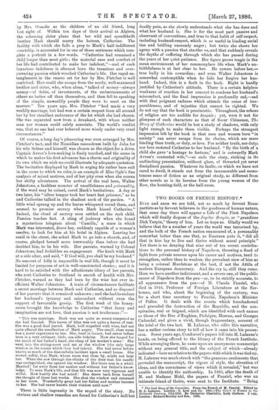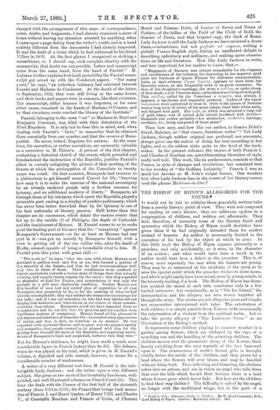TWO BOOKS ON FRENCH HISTORY.* EVER and anon we are
told, not so much by fervent Bona- partists as by fervent believers in the goodness of human nature, that some day there will appear a Life of the First Napoleon which will finally dispose of the Jupiter Scapin, or "grandiose Dick Turpin," theory of him. Let us hope so. Gladly would we believe that for a number of years the world was terrorised by, and the bulk of the French nation enamoured of, a personality somewhat better than one that, as Emerson puts it, " did all that in him lay to live and thrive without moral principle." Yet there is no denying that nine out of ten recent contribu- tions to the personal history of Napoleon, throwing a flood of light from private sources upon his career and motives, tend to strengthen, rather than to weaken, the prevalent view of him as being a colossal Murdstone at the best, if not the Attila of modern European democracy. And the cry is, still they come. Here we have another indictment, and a severe one, of the public career of Napoleon from the pen—or, to be strictly accurate, to all appearance from the pen—of M. Claude Fauriel, who died in 1844, Professor of Foreign Literature at the Sor- bonne, and who, about the beginning of the century, was for a short time secretary to Fouche, Napoleon's Minister of Police. It deals with the events which foreshadowed and preceded the destruction of the Republic, and the con- spiracies, real or feigned, which are identified with such names as those of the Duc d'Enghien, Pichegru, Moreau, and Georges Cadoudal, and gives a vivid, though fragmentary, account of the trial of the two last. M. Lalanue, who edits this narrative has a rather curious story to tell of how it came into his posses- , sion. Some years ago, Condorcet's papers fell into M. Lalanne's hands, on being offered to the library of the French Institute. While arranging them, he came upon an anonymous manuscript without any general title, and the subject of which—already indicated—bore no relation to the papers with which it was tied up. M. Lalanne was much struck with "the generous sentiments that pervaded the manuscript, the vigour of style, the elevation of ideas, and the correctness of views which it revealed," but was unable to identify the authorship. In 1883, after the death of M. and Madame Mohl, the papers of Fauriel, who was an intimate friend of theirs, were sent to the Institute. " Being
• The Last Days of the Consulate. From the French of M. Fanriel. Edited by M. L. Lalanne. London S. Low and Co. 1885.—The Court of France in the Sixteenth Century, 1514-1559. By Catherine Charlotte, Lady Jackson. 2 vole. London Richard Bentley and Son. 1886.
charged with the arrangement of this mass of correspondence, notes, drafts, and fragments, 1 had already examined a score of boxes without having my attention arrested by anything, when I came upon a page dating from the writer's youth, and in a hand entirely different from the documents I had already inspected.
It was the draft of a letter which he had addressed to his friend Villers in 1803. At the first glance I recognised so striking a resemblance, or, I should say, such complete identity with the manuscript, that doubt was not possible. Letter and manuscript came from the same hand, from the hand of Fauriel." M.
Lalanne further explains how in all probability the Fauriel manu- script got mixed up with the Condorcet papers. "For many years," he says, "an unbroken intimacy had subsisted between Fauriel and Madame de Condorcet. At the death of the latter,
in September, 1822, they were still living in the same house, and their books and papers were in common, like their existence. The manuscript, either because it was forgotten, or for some other cause, remained in the bands of Madame O'Connor, and by that circuitous route reached the library of the Institute." Fanriel, belonging to the same " set" as Madame de Steel and Benjamin Constant, was filled with their detestation of the First Napoleon. It is only fair to bear this in mind, and, when dealing with Fauriel's •' facts," to remember that he obtained
-them essentially from one quarter, and that the reverse of Bona- partist. He never, indeed, disguises his animus. At the same time, his narrative, or rather narratives, are eminently valuable
as a corrective to M. Thiers's. A perusal of the first chapter, containing a historical sketch of the events which preceded and foreshadowed the destruction of the Republic, justifies Fauriel's editor in warmly eulogising the picture of that meeting of the
Senate at which the prolongation of the Consulate to twenty years was voted. On that occasion, Bonaparte had recourse to a plebiscitum to get himself named Consul for life, "knowing how easy it is to make the exercise of the national sovereignty by an already enslaved people only a further resource for tyranny, and an additional mockery of liberty." Bonaparte, all through those of his intrigues which upset the Republic, played a miserable part, ending in a display of positive poltroonery, which has never been better described than by De Quincey in one of
his best outbreaks of literary passion. Still better than this chapter are its successors, which detail the various events that led up to the suicide (?) of Pichegru, the death of Cadoudal.
and the banishment of Moreau. M. Fauriel seems to us to make good the leading part of his case, that the " conspiracy " against Bonaparte's Government—so far at least as Moreau had any part in it—was got up mainly by Bonaparte himself, with a view to getting rid of the one soldier who, after the death of Hoche, seemed capable of being a formidable rival to him. M. Fauriel puts this point with great skill :—
" The truth is," he says, "that the men with whom Moreau sym- pathised in politics were only five or six, who formed a portion of the minority of the Senate, and that he had communications with only two or three of these. Their confidences were confined to barren aspirations towards a better state of things than that actually existing, and equally barren regrets for the latter ; this they regarded as shameful or fatal for France, and nevertheless it was only the prelude to a still more deplorable condition. Neither Moreau nor this handful of men had any settled plan of opposition to all that Bonaparte was preparing to do, or for the undoing of what he bad already accomplished ; they had neither the means nor the courage for the task ; and, if I am not mistaken, he who had won battles did not display less weakness and irresolution in the course of these commu- nications than others. Bonaparte could not have regarded them as conspiracies had he not felt that his projects and his conduct were legitimate sources of conspiracy. Moreau found all his pleasure in the repose and indolence of domestic life ; he avoided every appearance of action, and was, in fact, as harmless as he seemed. He was regarded with universal favour, and so great was the general apathy and cowardice, that people seemed to be pleased with him for dis- guising from himself the state of the Republic, and appearing uncon- scious of Bonaparte's fears and suspicions, however vain they were."
But for Moreau's indolence, he might have made a much more considerable figure in French history than he did. His defence, when he was placed on his trial, which is given in M. Fauriel's volume, is dignified and able enough, however, to atone for a considerable number of weaknesses.
A writer of a very different sort from M. Fauriel is the inde- fatigable Lady Jackson ; and she writes upon a very different subject. She gives us two more of her invariably handsome, well- printed, and well-illustrated volumes on French Court life. This time she deals with the France of the first half of the sixteenth century (from 1514 to 1559), the France that brings back memo- ries of Francis I. and Henri Quatre, of Henry VIII. and Charles V., of Constable Bourbon and Francis of Gaise, of Clement Marot and Etienne Dolet, of Louise of Savoy and Diana of Poitiers, of the follies of the Field of the Cloth of Gold, the disaster of Pavia, and that brigand orgy, the Sack of Rome. Lady Jackson is still the Lady Jackson we have reviewed a dozen
times,—industrious, but not perfecta ad unguent, writing a piebald Franco-English style, taking an unaffected delight in
describing upholstery and millinery, and making naïve observa- tions on life and literature. How like Lady Jackson to write, and how important for her readers to know, that,-
" Marguerite of Navarre was always remarkable for the elegance and suitableness of her toilettes, for correcting by her superior good taste the fondness of Queen Elenore for elaborate ornamentation. Lake, or dark crimson (laque foncee), appears to have been her favourite colour, as she frequently wore it on great occasions. On that of her daughter's marriage, she wore a coition, or under-dress, of that shade, a rich Venetian satin, embroidered and fringed with gold. This rotinen, called by the Venetians a carpetta, was always, it appears, a handsome and expensive garment. Ladies of the upper bourgeoisie were permitted to wear it. Over it the Queen of Navarre wore a long train of velvet of the same colour, lined with white satin, and fringed with gold. Her cap, to which was attached a long veil of gold tissue, was of netted gold riband, bordered with jewels— diamonds and rubies probably—her stomacher, cordelijre, earrings, necklace, &c., being composed of those gems."
Then how easy, and how like our author, to dismiss Dolet's friend, Rabelais, as "that coarse, licentious writer " ! Yet Lady Jackson, though neither original, nor profound, nor acccurate, always gives one the notion of doing her best according to her lights, and so she seldom sinks quite to the level of the book- maker. In the present volumes, the stories of both Francis I.
and Charles of Bourbon are, notwithstanding blemishes of style, really well told. This work, like its predecessors, reminds us that France, in spite of changes and revolutions, has remained true to her worship of "the Goddess Lubricity." Francis I. was as much her devotee as M. Zola's vulgar heroes. One wonders how often Lady Jackson has, in the course of her literary career,
used the phrase Maitresse-en-titre ?



































 Previous page
Previous page